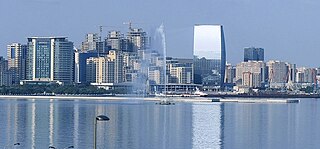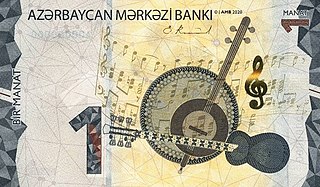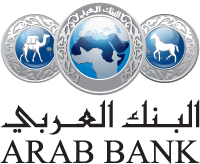Banking in Azerbaijan in its present form dates back to 1992, but it originates in the second half of the 19th century and continued through the Soviet period. It consists of the country's central bank, the Central Bank of Azerbaijan, founded on 11 February 1992, and other commercial banks. The commercial banks in the country are joint–stock.
The only valid currency in Azerbaijan is the Azerbaijani manat. Only the Central Bank can issue manats. During the transition to a market economy in the 1990s, the banking system was not meeting the needs of socioeconomic development as expected, and followed old, Soviet laws. Banks in Azerbaijan have mandatory reserves, determination of norms, regulations of liabilities between creditors and depositors, and deposit insurance. These laws were introduced in 1996 after the system proved to violate laws and timely repayments of deposits. The country's banking system is now stable.
Azerbaijan restored its independence on October 18, 1991. Besides the law "On Banks and Banking Activity in the Republic of Azerbaijan”, the law "On the National Bank of the Republic of Azerbaijan” [1] [2] In Article 19, paragraph 2 of the first Constitution of the Republic of Azerbaijan adopted in the referendum on November 12, 1995, it was reaffirmed that the right to issue and withdraw money from circulation only belongs to the National Bank. [3] The law "On the National Bank of the Republic of Azerbaijan” and "On Banks and Banking Activity in the Republic of Azerbaijan were re-adopted in a new edition on dates 10 June 1996, and 14 June 1996, respectively. New bank laws allowed the banking system to become closer to the world banking experience and establish credit institutions. In order to adapt to the updated scientific and theoretical methods and the requirements of modern ongoing processes, the law "On the National Bank of the Republic of Azerbaijan" was adopted on December 10, 2004. The law "On Banks" adopted on 16 January 2004, came into force on 30 March 2004. [4] In connection with the Referendum Act named "On Additions and Amendments to the Constitution of the Republic of Azerbaijan" dated March 18, 2009, "National Bank of the Republic of Azerbaijan" was renamed to "The Central Bank of the Republic of Azerbaijan". As a result of measures taken for the creation of deposit insurance mechanisms, the law "On Deposit Insurance" was adopted On 29 December 2006. Important activities are carried out in Azerbaijan to prevent legalizing criminally obtained money or other properties and financing of terrorism. In this regard, the law “On the Prevention of the Legalization of Criminally Obtained Funds or Other Property and the Financing of Terrorism” came into force on date 25 February 2009. [5]
On 6 March 2014 Fitch Ratings released an assessment of Azerbaijan’s banking sector as being "broadly stable," although highlighted structural issues that should be addressed to improve the sector. Fitch noted that retail lending is a higher growth segment than corporate lending. [6] Fitch also affirmed positive ratings on five different Azerbaijan banks. [7]

The economy of Azerbaijan is highly dependent on oil and gas exports, in particular since the completion of the Baku-Tbilisi-Ceyhan Pipeline. The transition to oil production in the late 1990s led to rapid economic growth over the period 1995–2014. Since 2014, GDP growth has slowed down substantially.

In the United States, banking had begun by the 1780s, along with the country's founding. It has developed into a highly influential and complex system of banking and financial services. Anchored by New York City and Wall Street, it is centered on various financial services, such as private banking, asset management, and deposit security.

Financial services are economic services tied to finance provided by financial institutions. Financial services encompass a broad range of service sector activities, especially as concerns financial management and consumer finance.

The manat is the currency of Azerbaijan. It is subdivided into 100 gapiks.

The Bangko Sentral ng Pilipinas is the central bank of the Philippines. It was established on July 3, 1993, pursuant to the provision of Republic Act 7653 or the New Central Bank Act of 1993 as amended by Republic Act 11211 or the New Central Bank Act of 2019. The principal author was Senator Franklin Drilon. It was signed by President Rodrigo Duterte.

The National Bank of Ukraine or NBU is the central bank of Ukraine – the government body responsible for a unified state policy in the field of the country's monetary circulation, including the strengthening of the national currency unit, the hryvnia. The National Bank of Ukraine employs over 12,000 people, making it one of the leading banks. It regulates and supervises activities, functions and the legal status of government and commercial banks based on the principles of the Constitution of Ukraine and the law of Ukraine.

The Czech National Bank, is the central bank and financial market supervisor in the Czech Republic, headquartered in Prague. It is a member of the European System of Central Banks. It was established on 1 January 1993 from the division of the State Bank of Czechoslovakia as part of the process of dissolution of Czechoslovakia, together with the National Bank of Slovakia.

Arab Bank is a Jordanian bank that is one of the largest financial institutions in the Middle East. It is Headquartered today in Amman, Jordan, and operates as a universal bank that serves clients in more than 600 branches spanning five continents. Arab Bank is a publicly held shareholding company listed on the Amman Stock Exchange.

The Central Bank of Azerbaijan is the central bank of Azerbaijan Republic. The headquarters of the bank is located in the capital city Baku.
Allied Banking Corporation was one of the largest banks in the Philippines. On February 9, 2013, the bank was merged with Philippine National Bank, creating the fourth largest private domestic bank in the Philippines.

The Central Bank of Armenia is the central bank of Armenia with its headquarters in Yerevan. The CBA is an independent institution responsible for issuing all banknotes and coins in the country, overseeing and regulating the banking sector and keeping the government's currency reserves. The CBA is also the sole owner of the Armenian Mint.

Following the Iranian Revolution, Iran's banking system was transformed to be run on an Islamic interest-free basis. As of 2010 there were seven large government-run commercial banks. As of March 2014, Iran's banking assets made up over a third of the estimated total of Islamic banking assets globally. They totaled 17,344 trillion rials, or US$523 billion at the free market exchange rate, using central bank data, according to Reuters.
A non-banking financial institution (NBFI) or non-bank financial company (NBFC) is a financial institution that is not legally a bank; it does not have a full banking license or is not supervised by a national or international banking regulatory agency. NBFC facilitate bank-related financial services, such as investment, risk pooling, contractual savings, and market brokering. Examples of these include hedge funds, insurance firms, pawn shops, cashier's check issuers, check cashing locations, payday lending, currency exchanges, and microloan organizations. Alan Greenspan has identified the role of NBFIs in strengthening an economy, as they provide "multiple alternatives to transform an economy's savings into capital investment which act as backup facilities should the primary form of intermediation fail."

In 2007, the financial sector of Morocco maintained an economic environment conducive to further growth of banking activity following a very good year for the sector in 2006. Morocco's banks have been largely unaffected by the credit crisis due to their limited connection to global financial markets. The number of people with a bank account increased from 25% in 2007 to 29% in 2008, while deposits rose by 11.1% to a record Dh572.3bn (€51.5bn), 20% of which belong to Moroccan nationals living abroad. Private banks are increasingly moving towards universal banking, buying companies in all segments of the financial industry. While GDP advanced 5.6% in 2008, outstanding loans jumped 23% to a record Dh519.3bn (€46.74bn) as more people bought and furnished property. As the rest of the world saw lending dry up, Moroccan banks issued more loans, showing 2.6% growth in the first five months of 2009.
AccessBank is a bank with headquarters in Baku, Azerbaijan.
Kapital Bank is a commercial bank operating in Azerbaijan. Founded in 1874 as Azerbaijan Savings Bank, it is headquartered in Baku.

Qatar Islamic Bank (Q.P.S.C.) was established in 1982 as the first Islamic financial institution in Qatar. Its products and operations are supervised by a Shari’a board, which ensures that the bank adheres to Islamic banking and finance principles. It is the country's largest Shari’a-compliant lender.
The Finance system in Azerbaijan consists of government policy and arrangements for borrowing and lending and the transfer of assets. The system is composed of banks, insurance companies, other financial institutions, pension system, financial markets and payment systems.

Banking in Turkey is an important aspect of the financial system Turkey's dynamic economy. Banks handle the majority of money and capital market transactions and activity. Commercial banks make up the majority of Turkey's financial sector, accounting for 91 percent of overall financial sector assets as of 2020.
Banking in Guyana follows the country's tumultuous economics history, from formal introduction under British rule, the socialist-oriented nationalization of banks at independence, to IMF sponsored open-market initiatives. The banking industry faces increased pressure to meet global standards domestically, as well as attract international investors, and serve the large number of diaspora that remain economically tied to the country.